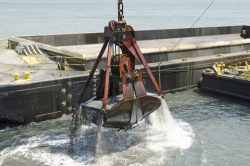Dredging: The Benefits and Its Importance
June 26, 2023 2:30 pm Leave your thoughts Dredging: The Benefits and Its Importance
Dredging: The Benefits and Its Importance
Dredging is an essential process used to maintain and improve waterways, harbors, and shorelines. The process involves the removal of sediments and debris from the bottom of water bodies, restoring and enhancing navigational channels, improving water quality, and protecting harbors. Dredging offers numerous benefits and is of utmost importance in various industries, including shipping, agriculture, and tourism.
Benefits of Dredging
1. Improved Navigation
Dredging helps to maintain waterways by removing accumulated sediment and debris. This restoration process improves the depth of channels, making it safer and easier for ships, boats, and other marine vessels to navigate. Improved navigation also reduces shipping costs, allowing vessels to carry more cargo and reduce fuel consumption.
2. Environmental Protection
Dredging can remove contaminants and pollutants from waterways, improving water quality and protecting aquatic habitats. The process can remove hazardous waste and toxins that can cause harm to the ecosystem and marine life.
3. Prevent Flooding
Dredging can also be used to prevent flooding by improving the capacity of waterways to hold more water, allowing them to handle high water flow rates. This reduces the risk of floods that can cause significant damage to nearby infrastructure and aquatic habitats.
4. Erosion Control
Dredging can help to prevent coastal erosion by restoring shorelines, which can be damaged by natural forces such as waves, storms, and currents. Dredging can help to preserve the coastline, prevent erosion, and maintain the natural landscape.
5. Land Reclamation
Dredging can help reclaim land from the sea, providing new land for development and expansion. In some cases, dredging can create new islands or habitats, providing opportunities for tourism and recreation.
The Importance of Dredging
In addition to the benefits, dredging plays a crucial role in various industries, including:
1. Shipping Industry
The shipping industry depends on waterways, ports, and harbors to transport goods and commodities. Maintaining these waterways is essential to ensure that large vessels and shipping containers can safely navigate through channels and access ports. Dredging can deepen waterways, allowing for larger vessels to enter and reduce shipping costs.
2. Agriculture
Dredging is crucial for the agriculture industry, particularly in coastal areas where fields and farmlands are exposed to saltwater intrusion. Dredging can prevent saltwater from entering waterways and polluting agricultural land, protecting crops from damage.
3. Tourism
Tourism plays a significant role in the economy of many countries. Dredging can help to create new beaches, restore damaged shorelines, and maintain the natural environment, making them more attractive to tourists. In addition, dredging can enhance recreational opportunities by improving water quality and depth, making it easier to swim, fish, and enjoy other water activities.
4. Energy Industry
The energy industry relies on waterways for transporting oil and gas, accessing offshore energy sources, and deploying underwater pipelines and cables. Dredging can maintain the depth of channels, making it safe and easier for ships and vessels to access offshore sites.
Environmental Concerns
While dredging offers numerous benefits and is of utmost importance to various industries, there are environmental concerns that need to be addressed. Dredging can disturb and damage aquatic habitats, scattered sediments that can cause harm to the ecosystem, and release pollutants and toxins.
To minimize the impact of dredging, environmental regulations and best practices have been put in place to guide the dredging process and ensure the protection of aquatic ecosystems. These regulations focus on reducing harm to the environment, ensuring public safety, and promoting sustainability.
Conclusion
Dredging is an essential process that plays a significant role in maintaining and enhancing waterways, harbors, and shorelines. The process offers numerous environmental, economic, and social benefits, including improved navigation, environmental protection, prevention of flooding, erosion control, and land reclamation.
Dredging is of utmost importance in various industries, including shipping, agriculture, tourism, and the energy industry. However, there are environmental concerns that need to be addressed, and environmental regulations and best practices have been put in place to guide the dredging process and ensure the protection of aquatic ecosystems.
Ultimately, dredging is a critical process that contributes positively to society and the environment. It is essential to be mindful of our impact on the environment and to carry out the dredging process sustainably and responsibly, ensuring the protection of aquatic habitats and the preservation of our natural resources.
Interested in learning more about dredging? Be sure to contact our excavating contractors here at Estes Excavating Inc. to learn more about what we can do for you!
Categorised in: Dredging
This post was written by admin
